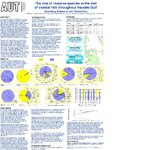- Joined
- Nov 19, 2002
- Messages
- 4,674
In another (Supporter) thread we were discussing the role of invasive species in marine systems. As this discussion is rather important I thought that we should include it here in 'Marine Conservation', even though it is not directly related to cephalopods.
We have been investigating the role of invasive species in the diets of coastal fish species throughout Hauraki Gulf, Auckland, New Zealand. The attached poster was put together by three of the undergraduates; unfortunately the lovely background formatting has been lost in the process of my reducing it down to a file size that can be read (and added) online. Warning, the file is large (the poster was A0), but the file needed to be large in order for folk to read the small print. This is one of 15 posters that we presented at this year's New Zealand Marine Sciences Society Conference in late August '07.
I'd just like it known that invasive species are not necessarily 'bad species'. There appear to be several instances where invasives are important (numerically) in the diets of fish (yellow in pie graphs), and possibly act as trophic surrogates for these fish in otherwise extensively modified marine habitat (anthropogenic disturbance) [where no natives exist any longer, and prey might otherwise be limited].
For anyone looking at an interesting Masters topic, this is a great one, regardless of where you are. I'd be interested in hearing from others who have or intend to do similar research.
Keep in mind that this is a combined undergraduate project (3rd year), so numbers of fish examined are (at times) low. Having said this, all three students (Clara, Shabana and Theresa) are immensely capable, and all will go on to do superb Masters theses/research. I wish the full poster formatting was apparent in the attached file; you'll have to blow it up on screen to view the print and graphs.
We have been investigating the role of invasive species in the diets of coastal fish species throughout Hauraki Gulf, Auckland, New Zealand. The attached poster was put together by three of the undergraduates; unfortunately the lovely background formatting has been lost in the process of my reducing it down to a file size that can be read (and added) online. Warning, the file is large (the poster was A0), but the file needed to be large in order for folk to read the small print. This is one of 15 posters that we presented at this year's New Zealand Marine Sciences Society Conference in late August '07.
I'd just like it known that invasive species are not necessarily 'bad species'. There appear to be several instances where invasives are important (numerically) in the diets of fish (yellow in pie graphs), and possibly act as trophic surrogates for these fish in otherwise extensively modified marine habitat (anthropogenic disturbance) [where no natives exist any longer, and prey might otherwise be limited].
For anyone looking at an interesting Masters topic, this is a great one, regardless of where you are. I'd be interested in hearing from others who have or intend to do similar research.
Keep in mind that this is a combined undergraduate project (3rd year), so numbers of fish examined are (at times) low. Having said this, all three students (Clara, Shabana and Theresa) are immensely capable, and all will go on to do superb Masters theses/research. I wish the full poster formatting was apparent in the attached file; you'll have to blow it up on screen to view the print and graphs.


